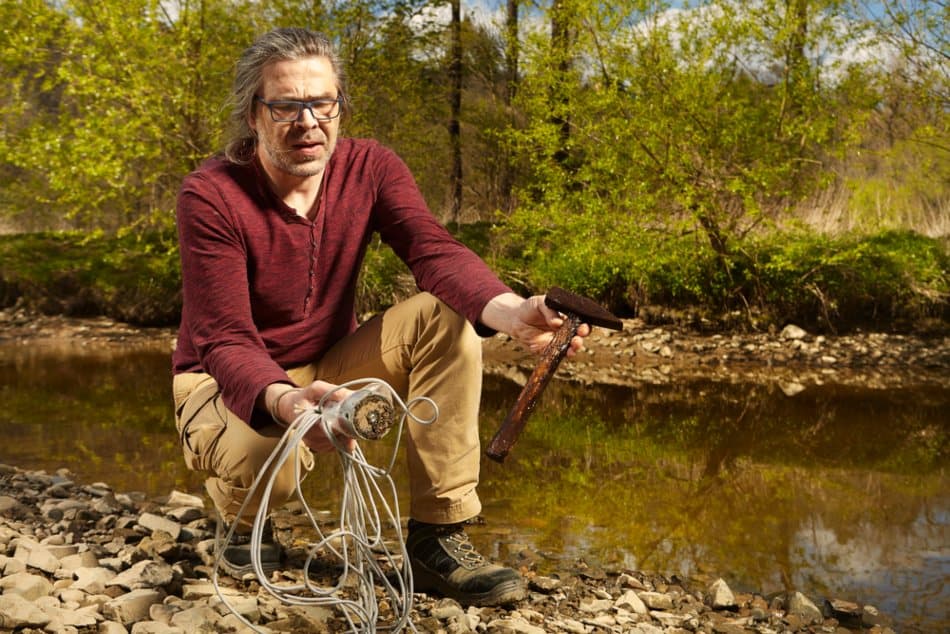
This website has lot of articles where I talk about different aspects of Magnet Fishing! But this article you are reading right now is the most complete resource I was able to make so far …
… My Goal?
Simply to include everything you need to know about this Hobby (tips, techniques, places, potential finds, equipment, risks, mistakes to avoid …) so, you will get started in this Wonderful Activity The Proper Way!
So, without further ado, Let’s dive in!
What is Magnet Fishing?
Magnet fishing has risen in popularity recently thanks to online forums and Youtube. In simple terms, the hobby involves a powerful magnet, typically one made of strong earth metals, and rope. The magnet is thrown into bodies of water, and retrieves any metal it can attract.
It’s fishing for metal in water.
Sounds simple, and essentially it is, but just like any other hobby this one can be as complicated and detailed as you make it. From the different types of magnets, to the techniques you explore, down to the perfect way to clean each individual find you come across.
This activity is a great way to explore your local surroundings, get in some exercise, and find some treasure.
Additionally, magnet fishing is one of the least expensive hobbies to get into and the investment remains relatively low (Check this Magnet Fishing Gear). Again, it is up to you how much you want to invest in the hobby. You won’t break the bank however.
Magnet Fishing Techniques you should learn …
1. How to clean your finds
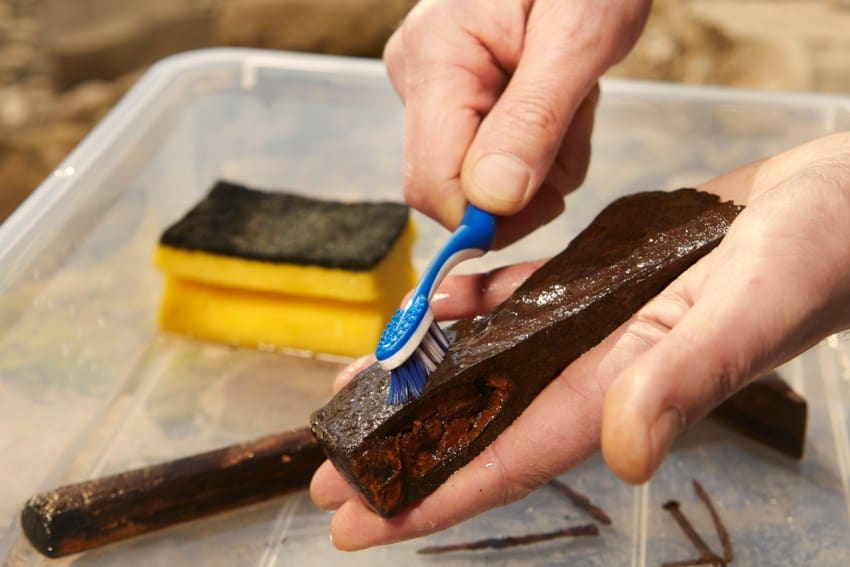
First off, you need to know not everything you pull out of the water is worth keeping. Most of the time you will pull out scrap metal that you more than likely will not want to keep long-term. A bucket specifically for these finds is helpful.
For the metal you want to keep, here are three techniques you should master.
- Wire Brush Scrub – This is a simple technique and only requires some water and a wire brush. The goal is to scrub away all surface dirt you find. This technique is best for surface rust or any loose dirt you can knock off.
- White Vinegar Dip – Next is the white vinegar dip. It is a natural way to remove surface rust. A wire brush will be useful with this technique. You’ll want to fully submerge your find for a minimum of 24 hours before attempting to scrub.
- Chemical Dip – This method is only for really dirty, rusty finds. Your choice of chemical is up to you, but use caution because some chemicals can be harmful. Always use gloves and soak in a well-ventilated area.
How you clean your finds is up to you, but always use caution when handling your metal finds.
Most often than not, the metals you find will be sharp and rusted. Keep that in mind when you are retrieving your magnet and when you move to the cleaning stage.
For more methods, you can have a look at these additional rust cleaning techniques!
2. Learn how to tie a strong knot.
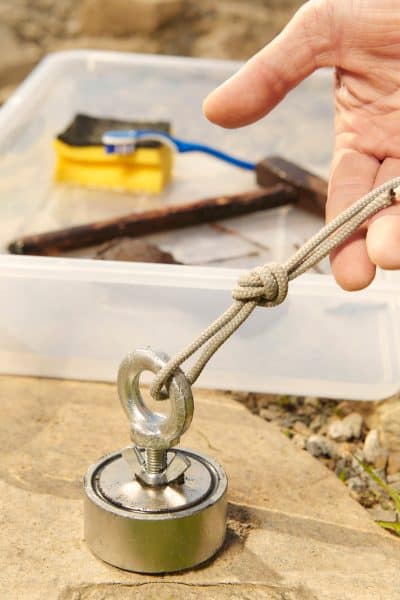
A strong knot will make or break your next fishing trip. For example, if you were to get stuck and had to pull on the rope hard to retrieve your magnet a weak knot would break loose and you would be out of a magnet.
The best knot you should know is the Palomar Knot. Here’s how to tie one.
- Step 1: Make a loop at one end of the rope.
- Step 2: Insert the loop through the eyebolt.
- Step 3: Loop it over onto itself.
- Step 4: Insert loop through.
- Step 5: Tighten it up a little.
- Step 6: Wrap it over the eyebolt.
- Step 7: Over until it knots with the rope.
- Step 8: Neatly pull to tighten.
- Step 9: Adjust the knot to shorten the excess rope.
- Step 10: Attach the eyebolt to the magnet.
Another knot to know is the Anchor Knot. Either way, regardless of the knot you choose to use it is best to master it. Also, equally important is to know how to untie it as well.
3. Doing Proper Prior Research
As with any hobby, you should do your research. Learn all you can about the hobby. The ins and outs, any tips, and what you should consider before making a trip out. Websites, online forums, and YouTube are great places to get information.
Something you should do before throwing your magnet into any body of water is finding out whether or not it is private or public. Most public waters, such as public lakes, are good places to begin with.
A quick Google search on a location will let you know if it is public or private. If you are unsure of a location, don’t bother visiting. Keep searching for somewhere you feel comfortable exploring.
4. Throwing Techniques
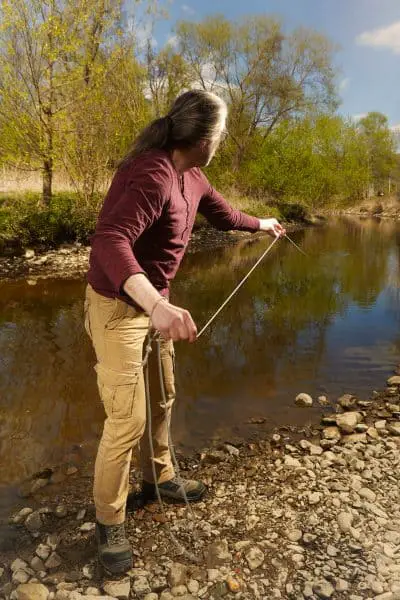
There are two techniques you’ll come across when magnet fishing, the throw and pull and drop and pull.
Both are self-explanatory.
To keep it simple, the drop and pull is best off ledges and bridges. You’ll use the throw and pull when level with the water. Each technique is easy to learn, but difficult to master.
Also, the weight of the magnet will determine how much of either technique you’ll be using. Heavier weights will take more energy to throw out and will get you larger pieces of metal out of the water. It is a trade-off.
The best way to learn these techniques is in your own yard first. Adjust to the weight, then try to pick up metal around your house. After some practice, you can take your magnet to the water better prepared.
5. Know when to Pull out
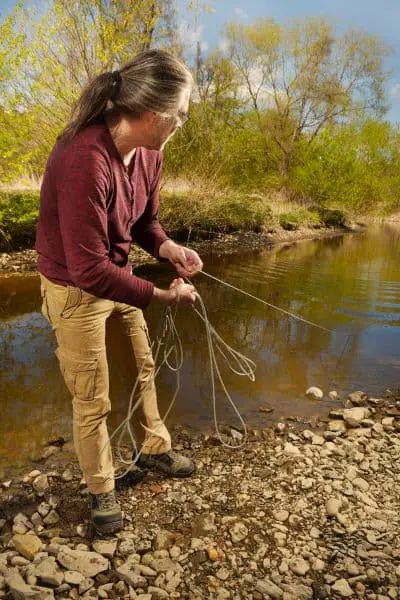
Experience will give the best answer of when to pull out your magnet. Magnet fishing is similar to sport fishing. It takes time to learn the difference between different underwater landscapes. Such as being caught on a branch or hooked into a fish. The same is true for here.
Over time you will understand the difference between being snagged and having something attached to your magnet. Unfortunately, this learning curve is what leaves many beginner magnet fishemen frustrated.
How long should you let your magnet sit in the water before pulling it back in? You have to let it sink to the bottom before you reel it in. The heavier the magnet, the faster it will sink. You’ll feel slight resistance as you drag the magnet.
Most smaller metal objects will give you no indication they are attached. It’s not till you start to feel a pull-back on rope to let you know something large is attached. Reel in slowly. If you come detached, throwback past where you were and pull till you reattach.
Patience is Key!
Magnet Fishing Gear (5 Must-Have Tools)
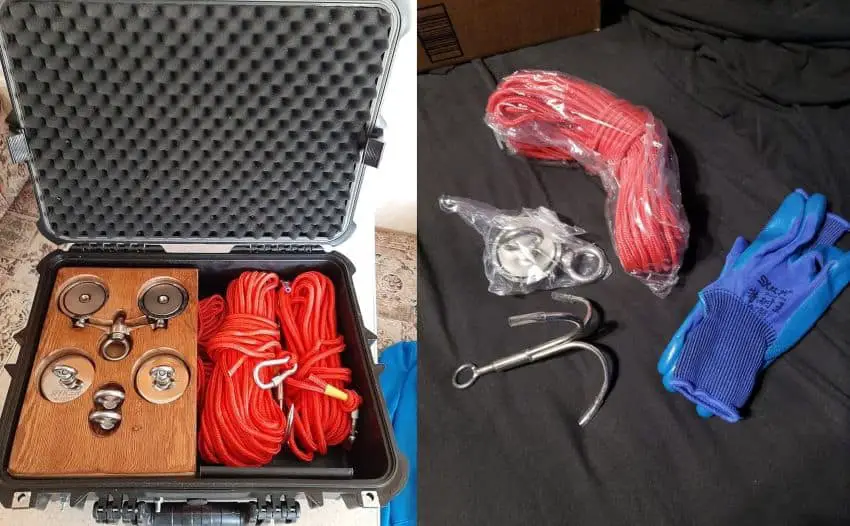
This quick list is of the 5 must-have tools you need to go magnet fishing today.
- Fishing Magnet (Check it Here at Amazon)– The most important tool you need is obviously a fishing magnet. Not just any magnet, but a magnet designed for the hobby. Most household magnets are not strong enough and they do not have a way to attach a rope to them. Look for a 500lb pulling force magnet to get you started.
- Rope (Check it Here at Amazon) – You need a way to toss your magnet and high-strength nylon rope is your best option. It will give you strong knots, will not break, and provides some elasticity which gives you better feedback on whether or not you have attracted any metal to your magnet.
- Gloves (Check it Here at Amazon) – Gloves are essential. Do not magnet fish without them. They protect your hands while handling your rope and protect your hands from the sharp, rusted metals you’ll come across. Also, they are important when cleaning your finds.
- Buckets – Buckets are the unsung hero of magnet fishing. They provide many uses such as storage, cleaning station, and a seat. Have at least two buckets with you when you go out fishing. One bucket can be for keeping your finds and tools. The other bucket for trash metal.
- Scraper – A flathead screwdriver or knife works well as a tool to clean off your magnet. You don’t always want to try to scrape off your magnet with your hands – even with a glove on. Instead, something flat will make it easier to remove your finds from your magnet.
These five tools are must haves. At the bare minimum, you should have all five to get started. You can always add to your equipment. It is best to keep your cost low and determine whether or not any additional tools are worth it.
For most trips, these five must haves are all you will need.
Types of Fishing Magnets you Can Use!
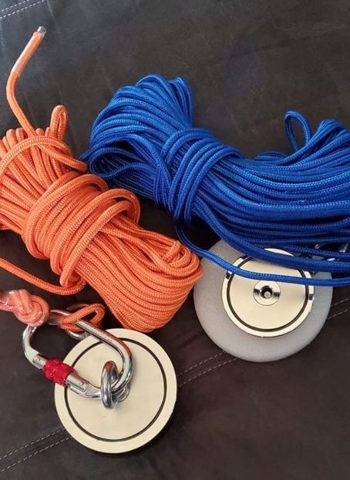
There are two types of magnets that come in all kinds of variations.
- The single sided magnet (Check it Here at Amazon) is the most common. They come in varying strengths from 500lbs upwards to 1,200lbs. The most highly recommended is the 500lbs magnet. It is a great all purpose magnet for the majority of metals you’ll find.
- The double sided magnet (Check it Here at Amazon) is just that, two magnets attached opposite of each other. These magnets are rated for their combined strength. For example, 800lb double sided magnets are two 400lb magnets attached.
Why would you use the weaker double sided magnet instead of a stronger single sided magnet?
Double sided are great for scoping out more surface area and picking up more trash metal along the way. Once you locate larger metal, then you would use a strong single sided magnet to retrieve it.
The best advice is to have multiple magnets. For different scenarios and in case you get snapped off and lose one.
3 Most Reliable Magnet Fishing Brands
There are many companies offering fishing magnets for sale. Here are the top 3 most reliable brands out there …
Wukong Magnets – This China based magnet company has been supplying consumers with reliable magnets for a while now. They produce high quality products that are always praised for their construction.
Their kits include a magnet, rope, and carabiner to attach the two. Buying a kit makes it more affordable to get started with magnet fishing, and Wukong offers different strengths at low prices. They ship mostly worldwide.
CMS Magnetics – This US based company has been around since 1999. Unlike most new up and coming companies, CMS Magnetics is an established company with a stellar reputation for making high-quality magnets.
They specialize in all types of magnets. You’ll have plenty of options to choose from with them.
Brute Magnetics – It has exploded in popularity recently. Although they are on the more expensive end, their pricing reflects their high quality products. The company strives to make magnet fishing more accessible to people by creating kits with everything needed to hit the water out the box.
What Magnet Fishing Finds Should you Expect?

What can you expect when you reel in your magnet? That’s part of the fun, the mystery of the catch. Most common finds are nails, screws, and scrap metal. Not so common finds include bikes, antiques, and sometimes guns. That’s right, weapons can be found.
Some lucky or unlucky, depending on who you ask, fishermen have come across grenades while magnet fishing.
You never know what you’ll find.
Have a look at this complete list of magnet finds! You will enjoy it …
Gold, Coins, Relics … Can your Magnet Pull out these?
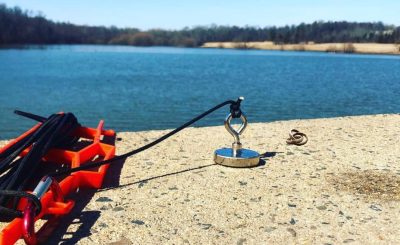
What about the real treasure you might be asking yourself. First off, gold is not magnetic, neither are most coins. Relics might not have enough metal in them to be retrieved either.
However, there are exceptions you should know about.
The biggest exception is the most sought after treasure, the cash box. Metal cash boxes mysteriously find themselves in bodies of water. And for you, that could mean a modern day treasure chest might be attached to your magnet.
Fishermen have found cash boxes filled with money, jewelry, and other valuable objects.
Also, gold may not be magnetic, but the other materials that make up the jewelry may contain enough magnetic metal to attach to your magnet.
This means it is possible to reel in some jewelry the next time you throw your magnet in the water.
5 Best Places to use your Fishing Magnet …

As mentioned, public bodies of water are the best and safest places to visit. In order of best places to fish, here are some suggestions.
- Ponds – Find a local pond and start there. They offer the best practice for using your magnet and require little traveling around to cover the whole area.
- Stream – Sometimes, streams lead to bigger bodies of water. Also, streams tend to be clear if they are active. Clear water leads to easier to spot treasure.
- Lakes – These giant bodies of water offer the most finds. People always tend to drop stuff off their boat. And that means many opportunities to retrieve what they lost.
- Historical sites – You are more likely to find relics in these places, such as lost dog tags or ammo.
- Rivers – These places offer a challenge. Flowing current can land an object downstream, plus you might have to fight the current to get your magnet back to shore. This only makes your find that much more of a challenge to get and might make it more valuable to you.
High traffic areas are the best places to consider. More people equals more lost treasure to find. Remote areas are not ideal places to visit…
… The possibility of getting lost trying to find remote bodies of water is not worth it. Plus, they may not hold anything valuable in them.
Stick to public areas with high traffic for the best results.
3 Magnet Fishing Safety Measures …
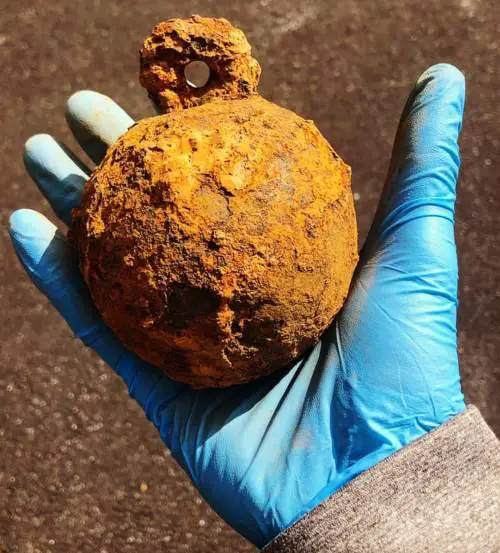
You might think this hobby could be harmless. For the most part, you are correct about that. Here are three common dangers and safety measures you should be aware of when magnet fishing.
- Sharp metal – You should never handle any metal you retrieve bare handed. Your gloves should stay on till you are completely sure it is safe to handle your find. Sharp, rusted metal can cut you deep and get infected. The best way to avoid any of that is to keep your gloves on.
- Your surroundings – The sun can wear you down fast. Sunburns or dehydration are easy to avoid, if you are aware of your current situation. Sun block and water will prevent both of these. These are two examples of your surroundings, but what about dogs or thunderstorms? Be aware of your surroundings at all times.
- Other People – In a way, this danger is relevant to your being aware of your surroundings. People can pose a threat in all kinds of ways. The obvious threat is you being robbed or harmed. You can avoid this by avoiding remote areas. Something not so obvious is a person handling your finds and harming themselves. Worse case scenario they say you are responsible for them getting injured. Avoid them if you can.
Use your best judgment when you go out throwing your magnet. Check the weather, determine whether or not you can fish the area, and be aware of your surroundings.
Is Magnet Fishing Legal?
In broad terms, it is. However, it is best to check online for any additional information. Everything depends on your location.
For the most part, many public bodies of water are fair game.
In the US, magnet fishing is not necessarily talked about. Which means many laws do not exist. Places such as Europe, the hobby is popular with more regulation.
1. In the US?
Again, in the US, most places are fair game. Certain places, such as South Carolina have more strict laws regarding magnet fishing.
For example, “The South Carolina Underwater Antiquities Act of 1991 states that underwater artifacts may only be collected if they are resting on the bottom sediments. Any disturbance or removal of unexposed or partially-buried embedded material is unlawful. Deployment of a tethered magnet does not allow identification as to which items are only resting on the bottom.” (Source)
This law means any artifacts older than 50 years belong to the state. It is punishable by fine. Private waters are exempt. The act is a perfect example of why you should do research before taking your magnet out.
2. Outside the US.
The UK is much more strict with their laws regarding this activity. You either get permission from the Canal and River Trust board or from a private property owner. The trust board regulates all public waterways and they make it difficult for magnet fishermen to fish.
Using private property involves getting written permission and you might have to split the value of the finds. It is only fair since you are using their land.
Other countries have laws that are either stricter or none at all. It is up to you to know your location and the legality of magnet fishing there.
Magnet Fishing Impact on the environment …
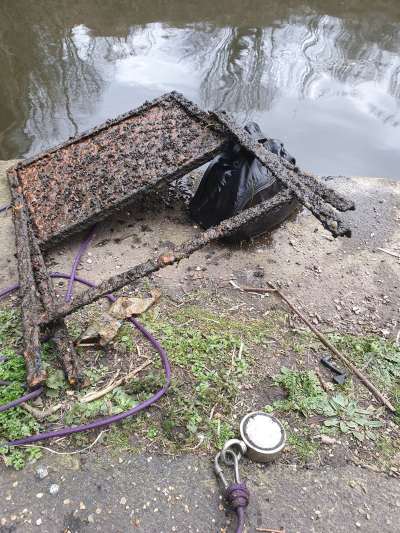
You are doing the environment a good deed by cleaning out the water. By removing rusting metal, you are protecting the wildlife and preventing someone or something from cutting themselves on sharp metal. Or, by removing a nail that could potentially impale a foot.
Most bodies of water collect trash, which is an unfortunate truth. You would be reversing this pollution by removing it and having it recycled.
Should you expect making a living out of this hobby?
Honestly, don’t have your hopes high. The reality is you will not become rich with this hobby. That doesn’t mean you can’t make some extra money recycling what you find though.
You might come across a few valuable things here and there. The best part of magnet fishing is enjoying the hunt and challenge of retrieving metal from the water. Plus, you are doing good for the environment.
If you can enjoy the process, and let each piece be its own little reward, then you will get the most out of this hobby.
Just because you can’t turn this hobby into a full-time income deter you from enjoying it. In fact, you might be the exception to the rule and find a way to make more money than most. It will take hard work and time, but that could be said about any other money making hobby.
Work on your technique, invest time on the water, and learn what different finds are worth money and go from there.
Either way, you are going to have fun during the whole process and you never know what you’ll find till you reel your magnet back in.
Conclusion
Hope this article was not too long of a read for you! In fact, I really wanted to make it such a complete and useful resource for anybody who wants to get started in this wonderful hobby …
… If this article was helpful, then please share it with others who might find it helpful as well!
